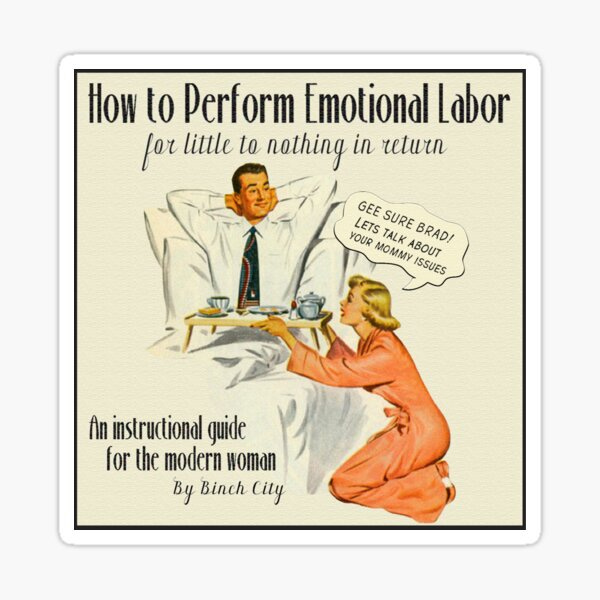Dear Friends,
Growing up, I internalized the idea that men are emotionally immature and it falls on women to guide us to become emotionally attuned adults.
My guy friends, while fairly evolved, rarely discuss our emotions. We talk about things (bikes, cars, gadgets) and goals (fitness, races, raises, and retirement) with a sprinkling of sports, music, news, and travel. But who can I talk to about anxiety, sadness, anger, self-doubt, and disappointment? Too often, the answer is women.
No wonder they are sick of our shit. We can’t hide our emotional states from them; they know us too well. It’s obvious when we’re sad, frustrated, or anxious — and why, they would like to know, do we refuse to talk it over with our closest guy friends?
As I grow older, my views have changed. Now, I see men and women as both as emotionally immature, albeit in our different ways.
If men fail to discuss our emotions, women often shift responsibility for managing theirs. Shawn Smith describes the tendency:1
Rather than speak directly about their own sadness or anger, someone might redirect the conversation onto their partners by saying things like “Why did you need to do that?” Or “Only someone with problems would say it that way.” These ad hominem attacks imply that they are not responsible for their own feelings, and that you are to blame for managing their emotions.
For example, it’s hard to admit, “I know I shouldn’t be this anxious about my mother’s medical appointment, but I have an irrational fear that she’ll receive bad news.” Instead, it’s tempting to project: “You haven’t even asked me about my mother’s doctor appointment. You don’t seem to care.”2
Men are notoriously bad at stating their needs. But so too, I’ve come to realize, are women. Smith describes “the guessing game:”
Instead of stating their needs outright, someone might say, “If you cared about me, you would know what I need.” This puts you in a state of constant uncertainty.
These are broad generalizations. Not all (or even most) women shift responsibility for managing their emotions or expect their partners to guess their needs. But many do. And men and women could learn a lot from each other to improve our emotional wellbeing.
Instead, we retreat into our gender-segregated media spaces where the manosphere extols stoicism and the womanosphere celebrates emotional vulnerability.
Like many men, I’m a sucker for The Daily Stoic. Here’s how Ryan Holiday sums up the philosophy:
You don’t control other people, you control yourself.
You don’t control situations, you control how you react to them.
Valuable life lessons, but they are reaching the wrong gender. Women need The Daily Stoic. Men need Brene Brown.
Generally, women ought to take more responsibility for managing their emotions while men need to open up more to their friends. Together we can find a healthy integration, neither projecting our negative emotions onto others nor bottling them up until we explode.
Fortunately, the culture is evolving.
is one of many disaffected feminists on Substack to emphasize the importance of claiming control over one’s feelings. Oprah Winfrey’s latest book covers the same ground: “The Power to Decide How You Feel.” And questions Gen Z women on TikTok who seek mental health diagnoses instead of taking responsibility for their emotions.Similarly, Charles Duhigg’s latest book is essentially a how-to manual for men to express their emotions disguised as a guide for optimizers to become a “Supercommunicator.”3 Most podcasters in the so-called “manosphere” are insistent about the value they have gotten from therapy — for instance, Tim Ferris’ episode on Internal Family Systems therapy, Peter Attia’s emphasis on emotional health, and Andrew Huberman’s mental health series with Paul Conti.
Instead of being emotionally immature in our own ways, men and women can learn from each other to improve our relationships and emotional well-being.
🧰 A useful tool
I’m great at email and phone calls but terrible at messaging. I want to use my phone as little as possible, yet my friends prefer to communicate via eight different messaging apps.4 Finally, I found a solution: Texts.com. I have deleted all social apps from my phone and muted most messaging apps. Instead, I spend about 30 minutes a day responding to everything all at once on my desktop.
👏 Kudos
More than 25,000 people ran the Boston Marathon on Monday. Pretty sweet, but how many could have run a relay race from Los Angeles to Las Vegas in just two days? (In your sandals!) Kudos to the six Rarámuri women from Chihuahua, Mexico who pulled it off earlier this month.
🎥 The Criterion Collection
I love the Criterion Collection’s YouTube channel of quasi-celebrities talking about their favorite independent cinema. I was especially touched by last week’s edition with Death Cab for Cutie frontman Ben Gibbard.
Have a great week!
David
Lest you think this made-up example comes from my marriage, Iris takes responsibility for her emotions more than just about anyone I know, and her mom has superlative health.
The book is twice as long as it ought to be, but I thoroughly enjoyed his conversation with Dax Sheperd that covers all the main ideas.
Seriously: iMessage, WhatsApp, Signal, Instagram, FB Messenger, Twitter DM, Discord, and god forbid, LinkedIn. Fortunately, Texts.com integrates them all, adds extra features, and even offers AI responses and summaries.







It’s funny, you said this with aplomb where I took thousands of words, but I agree emphatically that women need stoicism and philosophy in general; it’s not, however, something I literally ever have seen discussed among women friends unless I bring it up. I really lament that philosophy has become part of the manosphere while women are leaning into feminine stereotypes in the performed online vulnerability. I was actually quite skeptical of Brown because so many seemingly basic women were fans, so I thought she is a pop feminist. But of course, I was pleasantly surprised to find that she is a legit researcher. I wonder how you’re approaching sharing these ideas with people in your life, and if you’ve found any success.
I’ll just say that as I read this, I kept thinking this is written from a straight man’s perspective, and yes lots of generalizations.